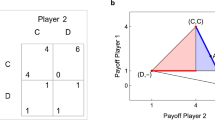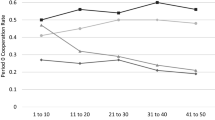Abstract
We investigate the role of payoff asymmetry in laboratory prisoner’s dilemma games. Symmetric and asymmetric games are examined in simultaneous and sequential settings. In the asymmetric sequential games, we study the impact of having payoff advantaged players moving either first or second. Asymmetry reduces the rates of cooperation in simultaneous games. In sequential games, asymmetry interacts with order of play such that the rate of cooperation is highest when payoff disadvantaged players move first.
Similar content being viewed by others
References
Agrawal, A., & Gibson, C. (1999). Community and conservation: Beyond enchantment and disenchantment. World Development, 27(4), 629–649.
Ahn, T. K., Ostrom, E., Schmidt, D., Shupp, R., & Walker, J. (2001). Cooperation in PD games: Fear, greed, and history of play. Public Choice, 106(1/2), 137–155.
Ahn, T. K., Ostrom, E., & Walker, J. (2003). Heterogeneous preferences and collective action. Public Choice, 117, 295–314.
Andreoni, J., & Varian, H. (1999). Preplay contracting in the prisoners’ dilemma. Proceedings of the National Academy of Sciences, 96, 10933–10938.
Andreoni, J., Brown, P. M., & Vesterlund, L. (2002). What makes an allocation fair? Some experimental evidence. Games and Economic Behavior, 40, 1–24.
Baland, J.-M., & Platteau, J.-P. (1996). Halting degradation of natural resources: Is there a role for rural communities?. New York: UN Food and Agriculture Organization and Oxford University Press.
Bardhan, P., & Dayton-Johnson, J. (2001, September). Inequality and governance of water resources in Mexico and South India. Paper prepared at the Workshop on Economic inequality, Collective Action and Environmental Sustainability, Santa Fe Institute, Santa Fe, New Mexico.
Bardhan, P., & Dayton-Johnson, J. (2002). Unequal irrigators: Heterogeneity and commons management in large-scale multivariate research. In E. Ostrom, T. Dietz, N. Dolsak, P. C. Stern, S. Stonich, & E. U. Weber (Eds.), The drama of the commons (pp. 87–112). Washington: National Academy Press.
Berg, J., Dickhaut, J., & McCabe, K. (1995). Trust, reciprocity, and social history. Games and Economic Behavior, 10, 122–142.
Binmore, K. G. (1998). The evolution of fairness norms. Rationality and Society, 10(3), 275–301.
Bohnet, I., & Frey, B. S. (1999). The sound of silence in prisoner’s dilemma and dictator games. Journal of Economic Behavior and Organization, 38, 43–57.
Bolton, G. E., & Ockenfels, A. (2000). ERC: A theory of equity, reciprocity, and competition. American Economic Review, 90, 166–193.
Brandts, J., Saijo, T., & Schram, A. (2004). How universal is behavior? A four country comparison of spite, cooperation and errors in voluntary contribution mechanisms. Public Choice, 119(3–4), 381–424.
Brosnan, S. F., & de Waal, F. B. M. (2003). Monkeys reject unequal pay. Nature, 425, 297–299.
Budescu, D. V., Rapoport, A., & Suleiman, R. (1990). Resource dilemmas with environmental uncertainty and asymmetric players. European Journal of Social Psychology, 20, 475–487.
Cain, M. (1998). An experimental investigation of motives and information in the prisoner’s dilemma game. Advances in Group Processes, 15, 133–160.
Charness, G., & Dufwenberg, M. (2006). Promises and partnership. Econometrica, 74(6), 1579–1601.
Cho, K., & Choi, B. (2000). A cross-society study of trust and reciprocity: Korea, Japan, and the U.S. International Studies Review, 3(2), 31–43.
Clark, K., & Sefton, M. (2001). The sequential prisoner’s dilemma: Evidence on reciprocation. Economic Journal, 111(468), 51–68.
Cox, J. C., Friedman, D., & Gjerstad, S. (2007, in press). A tractable model of reciprocity and fairness. Games and Economic Behavior.
Crawford, S. E. S., & Ostrom, E. (2005). A grammar of institutions. In E. Ostrom (Ed.), Understanding institutional diversity (pp. 137–174). Princeton: Princeton University Press. Originally published in American Political Science Review, 89(3) (1995), 582–600.
Croson, R. (2007). Theories of commitment, altruism and reciprocity: Evidence from linear public goods games. Economic Inquiry, 445(2), 199–216.
Fehr, E., & Gächter, S. (2002). Altruistic punishment in humans. Nature, 415, 137–140.
Fehr, E., & Rockenbach, B. (2003). Detrimental effects of sanctions on human altruism. Nature, 422, 137–140.
Fehr, E., & Schmidt, K. (1999). A theory of fairness, competition, and cooperation. Quarterly Journal of Economics, 114, 817–868.
Hayashi, N., Ostrom, E., Walker, J., & Yamagishi, T. (1999). Reciprocity, trust, and the illusion of control: a cross-societal study. Rationality and Society, 11(1), 27–46.
Henrich, J., Boyd, R., Bowles, S., Camerer, C., Fehr, E., Gintis, H., & McElreath, R. (2001). In search of Homo Economicus: Behavioral experiments in 15 small-scale societies. American Economic Review, 91, 73–78.
Isaac, M., Walker, J., & Williams, A. (1994). Group size and the voluntary provision of public goods: experimental evidence utilizing large groups. Journal of Public Economics, 54(1), 1–36.
Kollock, P. (1998). Transforming social dilemmas: Group identity and cooperation. In P. Danielson (Ed.), Modeling morality, rationality, and evolution (pp. 186–201). Oxford: Oxford University Press.
Lam, W. F. (1998). Governing irrigation systems in Nepal: Institutions, infrastructure, and collective action. Oakland: ICS.
Lee, M., Ostrom, E., & Walker, J. (2004). Institutions, heterogeneity, trust, and the possibility of cooperation in social dilemmas. Korean Review of Public Administration, 38(1), 1–21.
Ochs, J., & Roth, A. E. (1989). An experimental study of sequential bargaining. American Economic Review, 79, 355–384.
Orbell, J. M., & Dawes, R. M. (1993). Social welfare, cooperators’ advantage, and the option of not playing the game. American Sociological Review, 58, 787–800.
Ostrom, E. (1990). Governing the commons: The evolution of institutions for collective action. New York: Cambridge University Press.
Ostrom, E. (2001). Reformulating the commons. In J. Burger, E. Ostrom, R. B. Norgaard, D. Policansky, & B. D. Goldstein (Eds.), Protecting the commons: a framework for resource management in the Americas. Washington: Island.
Poteete, A., & Ostrom, E. (2004). Heterogeneity, group size and collective action: The role of institutions in forest management. Development and Change, 35(3), 435–461.
Rabin, M. (1993). Incorporating fairness into game theory and economics. American Economic Review, 83(5), 1281–1302.
Rapoport, A., & Chammah, A. M. (1965). Prisoner’s dilemma: A study in conflict and cooperation. Ann Arbor: University of Michigan Press.
Ruttan, L. M., & Borgerhoff Mulder, M. (1999). Are East African pastoralists truly conservationists?. Current Anthropology, 40(5), 621–652.
Snidal, D. (1995). The politics of scope: Endogenous actors, heterogeneity and institutions. In R. O. Keohane & E. Ostrom (Eds.), Local commons and global interdependence pp. 47–70). Thousand Oaks: Sage Publications.
Tangney, J. (1995). Recent advances in the empirical study of shame and guilt. The American Behavioral Scientist, 38(8), 1132–1145.
Trivers, R. (1971). The evolution of reciprocal altruism. Quarterly Review of Biology, 46(1), 35–57.
Van Dijk, E., & Wilke, H. (1995). Coordination rules in asymmetric social dilemmas: A comparison between public goods dilemmas and resource dilemmas. Journal of Experimental Social Psychology, 31(1), 1–27.
Varughese, G., & Ostrom, E. (2001). The contested role of heterogeneity in collective action: Some evidence from community forestry in Nepal. World Development, 29(5), 747–765.
Author information
Authors and Affiliations
Corresponding author
Rights and permissions
About this article
Cite this article
Ahn, T.K., Lee, M., Ruttan, L. et al. Asymmetric payoffs in simultaneous and sequential prisoner’s dilemma games. Public Choice 132, 353–366 (2007). https://doi.org/10.1007/s11127-007-9158-9
Received:
Accepted:
Published:
Issue Date:
DOI: https://doi.org/10.1007/s11127-007-9158-9




